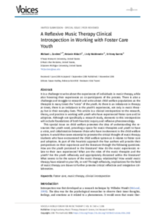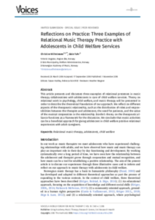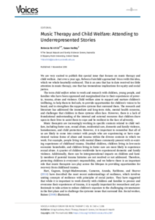Displaying 1081 - 1090 of 2221
The present study analyzes the opinions of birth families, foster families and social workers responsible for supervising contact visits regarding the benefits and problems associated with contact visits.
This article is a clinical introspection to the research, theory, and practice in working with youth who have experienced foster care and/or adoption. It is part of the Voices Special Issue on Music Therapy Child Welfare.
This article presents and discusses three examples of relational processes in music therapy collaborations with adolescents in care of child welfare services.
The aim of this study was to investigate the degree to which data collection achieves screening aims (identifying scale of problem, impacting on mental health) and the potential analytic value of the dataset.
This editorial introduces the Voices Special Issue on Music Therapy and Child Welfare.
This review assesses the literature that describes the risk and protective factors for children in out-of-home care (OOHC) experiencing educational disadvantage.
This project attempts to put numbers on the foster care capacity in each state in the US.
This study sought to find out the current numbers of autistic Looked-After children formally recorded across local authorities in England, and whether their needs are given special attention via strategic planning and oversight, using Freedom of Information (FoI) requests sent to all local authorities in England.
This study involved a comprehensive literature review, an environmental scan, and interviews with 20 former youth in care in Canada, focusing on what helps and hinders youth in care to graduate from high school.
This country care review includes the care-related Concluding Observations adopted by the Committee on the Rights of the Child.




